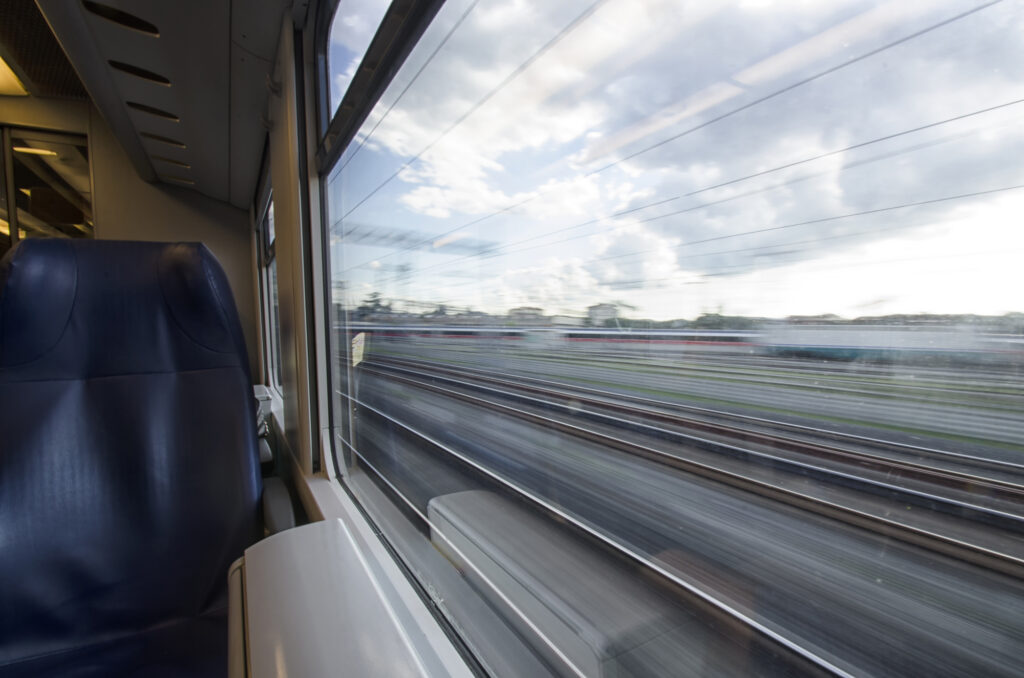Planning a trip to Japan? It’s almost impossible to avoid riding public trains on your journey to the country, but that’s no problem—the Japanese train system is one of the most-respected, most-efficient public transit systems in the world. If you’re staying in a major city like Tokyo or Osaka, you’ll absolutely want to utilize the convenience of the trains when moving from place to place.
Stepping onto the platform can be daunting if it’s your first time riding the train. Many visitors aren’t sure how to act when it comes to train etiquette, and they’re often more worried about finding and boarding the correct train than how their actions might affect those around them. It’s a smart idea to brush up on train etiquette before riding.
Let’s explore some of the most common questions and answers about train etiquette that travelers and first-time riders tend to have.

How to behave while riding the train
As with many other aspects of Japanese daily life, there are rules of etiquette to follow as you enjoy the country’s well-run train system. Thankfully, they’re relatively simple and often, second-nature to most people. Keep these 10 tips in mind as you ride the rails in Japan:
- Be mindful of personal space. No matter what country you’re in, personal space is important. Be aware not just of the space your body’s taking up, but also your belongings. Remember to share seating with others, and don’t place luggage or belongings on any seats. If you’re traveling through Japan with a lot of luggage, keep it as close as possible to you and make use of any overhead shelves, if available.
- Stay quiet and courteous. Many Japanese adults of all ages and walks of life spend a good portion of their day commuting on trains. Trains are often crowded, regardless of the time of day, and commuters want both a quiet start to their day and a time to relax as they’re making their way home once the workday’s done. Keep noise to a minimum by talking quietly with any travel companions or when talking on the phone. If you’re listening to music or watching media, always use headphones, and keep the volume to an appropriate level so that noise isn’t leaking out.
- Silence or mute your phone. One of the essential components of Japanese train etiquette is putting your phone on silent before you get onboard. If you must talk on the phone when riding on a train like the shinkansen, take phone calls only in the area between train cars. Keep your voice at an appropriate level and avoid disturbing others as much as possible. Again, headphones are a must-have accessory for riders who plan to listen to music or watch videos.
- Offer your seat to others. You should always be courteous during your travels in Japan, especially when using the train system. It’s only common courtesy to offer your seat to someone who might need it. Keep in mind that the color of each train seat is important, designating priority seating for people with disabilities, pregnant women, young children, etc. Even if you aren’t in a priority seat, be a mindful visitor and offer it to someone in need.
- Wait your turn on and off. While the Japanese prioritize timeliness in all facets of life, there’s no need to rush on and off trains. As you’re waiting for the train, wait in line and let deboarding passengers get off the train before you board. Never cut in line and never rush to get on the train. If the doors are closing and signals are sounding, wait for the next train—trying to squeeze on is dangerous at worst, and may delay the train at best. At busier stations, there will be attendants at stations to help moderate some of this on-off traffic and keep everyone organized and orderly.
- Don’t eat or drink on the train. Japanese rules of etiquette deem it rude to eat or drink outside in public. Even simple snacks and drinks purchased at conbini, or convenience stores, are often consumed inside the store or just outside the doors. This rule holds true as you ride trains in Japan, unless you’re riding the shinkansen (bullet train), or if you’re on a long train ride in a green car. If you’re in a seat that has a table and cup holder, it’s a good sign you’re welcome to consume food and drinks on the train.
- Take all litter with you. Never leave personal belongings or garbage on a Japanese train. Newspapers, used tissues and other items should be disposed of in trash cans on platforms as you exit the train. It’s impolite to litter no matter where you are in Japan—or in the world, for that matter—so be a good steward of the environment and be mindful of your trash. Place any trash in your pocket as you exit the train, and look for the appropriate receptacles to dispose of these items on the platform. You’ll be reminded of this while you ride the train with signage, and you’ll instantly notice how clean Japanese trains are!
- Don’t smoke (unless in the smoking car). In general, you should only smoke in designated outdoor areas in Japan, but smoking indoors is often acceptable. Trains represent an exception to this rule. Unless you’re in a smoking car on the shinkansen, refrain from smoking on Japanese trains. Alongside this, make sure you’re discarding cigarette butts in the appropriate receptables and not littering them at the platform or anywhere else.
- Don’t do your makeup. Doing your makeup in public is considered poor etiquette in Japan. Not only could cosmetic products spill as the train is in motion, but people are often disturbed when they’re forced to see a person grooming themselves in public. Do your makeup or other personal care activities at home to ensure a pleasant train ride for everyone. If you feel the need to touch up your appearance, do so in a lavatory where you have the privacy necessary for self-grooming.
- Pay attention to announcements. You can make it easy on yourself, as well as other passengers, by paying close attention to announcements as you ride the Japanese train system. Before visiting the country, try to familiarize yourself with some of the common announcements you might hear as you travel on the Japanese train system. Some announcements indicate sudden stops, while others indicate the train is coming soon, so you should queue up with others getting ready to board.
As mentioned, most of these rules will come second-nature to people who are conscious of their public etiquette. Just focus on being mindful of those around you: acknowledging their personal space, limiting your disruptiveness and acting with respect to your environment.
Tips for first-time train riders
If you’re getting ready to ride a Japanese train for the first time, there are a few things you can do to keep your mind focused on etiquette, and to ease the stress of navigating the experience. Here’s how:
- Arrive at the platform 10-15 minutes before your train is scheduled to arrive, to get comfortable with the platform. Remember that even if you miss your train, another will be along shortly. Get acclimated with your surroundings to improve your awareness and avoid etiquette mistakes.
- Pay attention to signage to keep yourself informed of what’s acceptable, such as eating or smoking in certain areas. When in doubt, refrain from these activities. Remember, you’re unlikely to be at a platform for more than 10-15 minutes.
- Pay attention to what others do when the time comes to get on or off the train. If you see people beginning to move to a certain location or behave in a certain way, it’s not a bad idea to mimic this behavior.
Riding the train in Japan for the first time can cause some anxiety, but you’ll quickly get acclimated after just a couple of trips. To help get this anxiety out of the way, find a reason to ride the train several times early in your trip to Japan!
Trains are a big part of travel in Japan
Train travel is an everyday way of life for the Japanese people, and as a respectful visitor to the country, you need to be aware of the ins and outs of Japanese train etiquette. Not only will you make a great impression on your hosts, you’ll also make your travels more comfortable and convenient.
Whether you’re taking the train to a nearby historical site or moving from city to city, prefecture to prefecture, there’s a good chance you’ll find yourself on a train in Japan. Keep these tips in mind during your journey and enjoy one of the world’s fastest, cleanest, safest and most efficient train systems. You’ll be surprise at how quickly anxiety about train etiquette can transform into confidence and enjoyment as you ride the rails.
- How Much Money Can You Make Teaching English in Japan? - December 12, 2022
- The Best Places to Teach English in Japan - December 9, 2022
- The Best Credentials for Teaching English in Japan - December 8, 2022








